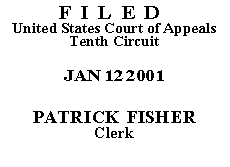

| KEVIN A. DEHAAN, individually
and as next friend of Rebecca Anne
DeHaan, his daughter,
Plaintiff-Appellant, v. UNITED STATES OF AMERICA, Defendant-Appellee. |
|
Plaintiff filed an action against the United States under the Federal Tort Claims Act, alleging liability under several tort theories for the United States Air Force's part in prohibiting plaintiff from exercising his custodial parental rights, as determined by a New Mexico state court. The facts and circumstances leading up to this action are not relevant to this appeal, so we will not detail them here. Suffice it to say that plaintiff filed the action seeking damages under the Federal Tort Claims Act (FTCA), later asserted a constitutional tort theory, and took this appeal when the district court granted the United States summary judgment on the FTCA claims without allowing plaintiff to amend his complaint to add the constitutional tort claim. We affirm.
After plaintiff filed his complaint, the government moved to dismiss the action based on the discretionary function exception to the FTCA, and the district court notified the parties that it would consider the matter on summary judgment. After plaintiff's first attorney filed a response to the motion to dismiss, he withdrew from the case, and another attorney appeared on behalf of plaintiff. The second attorney filed a supplemental response to the motion to dismiss, arguing liability under a constitutional tort theory, a claim that was not advanced in the complaint. He argued that the United States Air Force had violated plaintiff's Fourteenth Amendment rights by depriving him of the companionship of his daughter without notice or hearing. Plaintiff did not file a formal motion to amend the complaint, but in the last sentence of his supplemental response to the motion to dismiss, he requested "[i]n the alternative, . . . leave to amend the complaint to include claims under the Fifth and Fourteenth Amendments." App. at 119.
The district court did not specifically address plaintiff's request as a motion to amend. It granted summary judgment in favor of the United States based on the discretionary function exception to the FTCA, but acknowledged and discounted plaintiff's constitutional claims by stating:
DeHaan's arguments related to a deprivation of Fourteenth Amendment rights are also completely misplaced. He has pled no claim of a constitutional violation and cannot do so where he alleges jurisdiction pursuant to the Federal Tort Claims Act. Again, no set of facts could provide DeHaan with a claim against the United States for violation of constitutional rights, and Defendant is entitled to a dismissal.
App. at 134.
Although plaintiff states in his brief on appeal that the district court erred in failing to specifically address his request for leave to amend, the crux of his argument on appeal is that the district court erred in its "de facto" denial of his request to amend. Appellant's Br. at 5. Consistent with plaintiff's argument, we read the district court's order to have denied the request for leave to amend because amendment would have been futile. See Foman v. Davis, 371 U.S. 178, 182 (1962) (holding that leave to amend need not be freely given when amendment would be futile). Although generally we review the refusal of leave to amend for an abuse of discretion, "[t]he futility question is functionally equivalent to the question whether a complaint may be dismissed for failure to state a claim, a question this court reviews de novo." Gohier v. Enright, 186 F.3d 1216, 1218 (10th Cir. 1999). "A proposed amendment is futile if the complaint, as amended, would be subject to dismissal."
Here, plaintiff submitted no amended complaint, so the district court had only the statement of plaintiff's new legal theory in his supplemental response on which to base its futility determination. Cf. D. N.M. Rule 7.1 (motion must state grounds with particularity); 7.5 (movant must submit supporting brief); 15.1 (proposed amendment must accompany motion to amend pleading). For purposes of review, we also look to plaintiff's constitutional tort argument in his supplemental response as his statement of the particular grounds for his proposed amendment. We agree with the district court that plaintiff's constitutional tort claim, as stated in his supplemental response, would have been subject to dismissal in an amended complaint. Plaintiff suggested no jurisdictional basis for asserting constitutional tort claims against the United States, which is immune from suit unless it waives its sovereign immunity, Fent v. Oklahoma Water Res. Bd., No. 99-6188, 2000 WL 1846240, at *2 (10th Cir. Dec. 18, 2000). Further, plaintiff named only the United States as defendant in the action. He did not allege claims against any person in their individual capacity, thus precluding a Bivens-type action. See National Commodity & Barter Ass'n, Nat'l Commodity Exch. v. Gibbs, 886 F.2d 1240, 1247 (10th Cir. 1989). Consequently, we conclude that the district court did not abuse its discretion in refusing plaintiff's request for leave to amend his complaint. AFFIRMED.
Entered for the Court
Circuit Judge
*. This order and judgment is not binding precedent, except under the doctrines of law of the case, res judicata, and collateral estoppel. The court generally disfavors the citation of orders and judgments; nevertheless, an order and judgment may be cited under the terms and conditions of 10th Cir. R. 36.3.